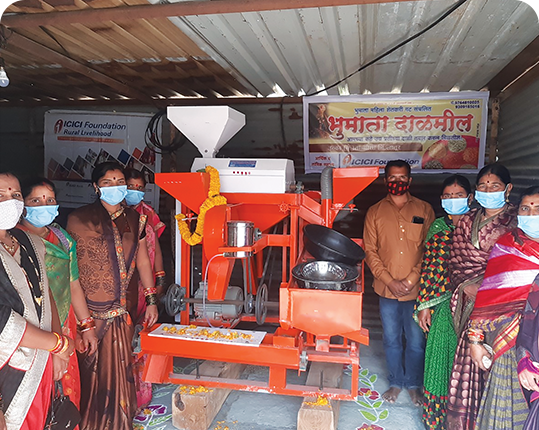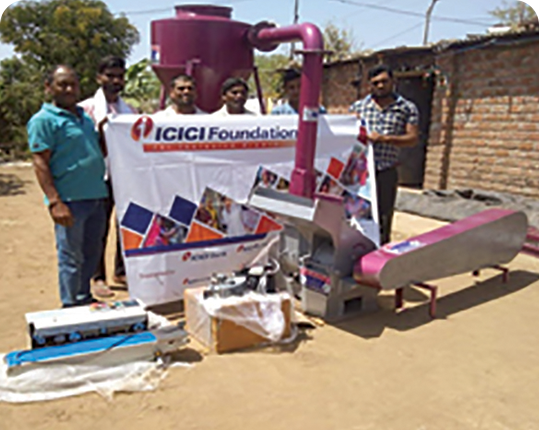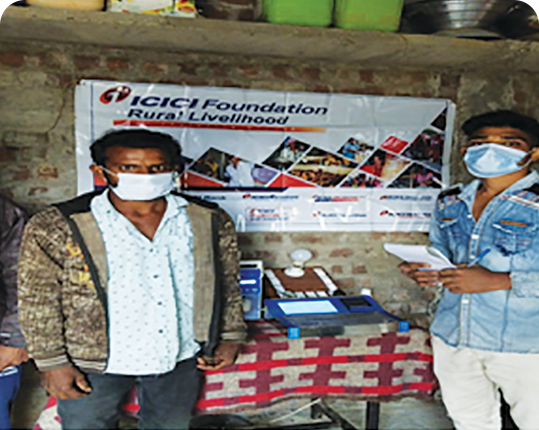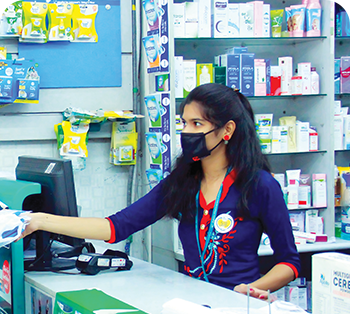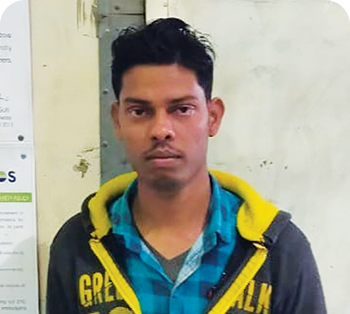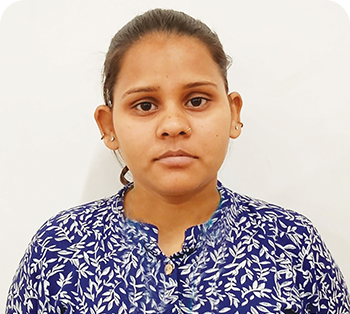ICICI Foundation for Inclusive Growth
ICICI Bank set up ICICI Foundation for Inclusive Growth (ICICI Foundation) in 2008 with a view to consolidate, enhance and expand its social development efforts. Working across 28 states and 8 Union territories, ICICI Foundation operates in the areas of skill development and sustainable livelihoods for the less privileged, environment conservation, financial inclusion, healthcare and other social projects across rural and urban areas of the country.
ICICI Foundation implements its wide array of interventions through its livelihood programmes in rural areas, Rural Self Employment Training Institutes (RSETIs) at Udaipur and Jodhpur and nationwide centres of ICICI Academy for Skills. Further, ICICI Foundation has undertaken relief activities towards the pandemic in collaboration with the government and local authorities. In fiscal 2022, ICICI Foundation supplemented its previous years' efforts with additional support of required medical equipment like ventilators, concentrators, ambulances and setting up of oxygen plants among others.
At the heart of our inclusive growth strategy is our concerted focus on rural development with emphasis on developing villages as a self-sustaining ecosystem. We enable this through integrated value chain interventions in agriculture and allied activities. This helps Indians in the rural areas to participate in, and benefit from the nation’s economic progress.
Women empowerment is a core driver of our inclusive growth philosophy as we consider it to be vital for building a sustainable future. We have put in place customised initiatives and projects to help women become economically independent and key contributors to decision-making.
Impacting Lives through Inclusive Growth
Our systematic and concerted programmes for promoting inclusive growth have transformed the lives of 765,166 Indians till March 31, 2022.
Trained since inception till March 31, 2022
- 447,619
- 185,543
- 132,004
- 765,166
- Rural Livelihood Initiatives
- ICICI Academy for Skills
- ICICI RSETIs
- Total
- 140,622
- 25,893
- 17,571
- 184,086
Trained in fiscal 2022
ICICI Foundation's activities are spread across 3,756 villages. Of the total beneficiaries, more than 55% are women.
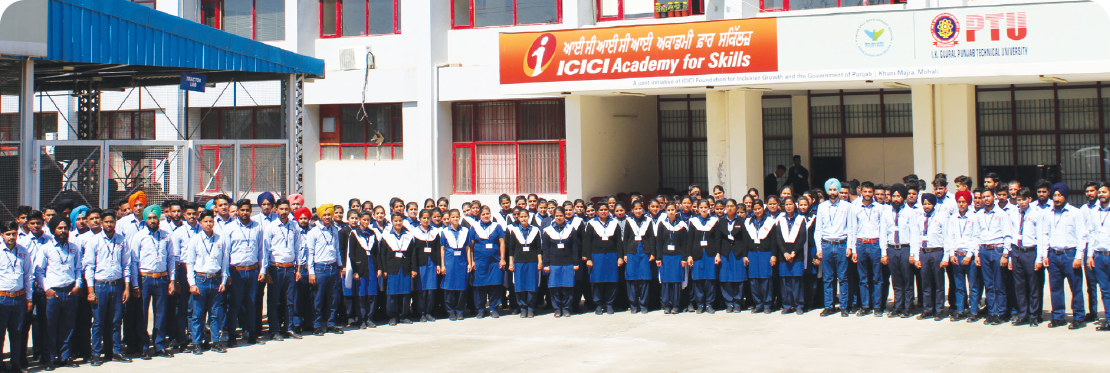
Trainees at ICICI Academy for Skills in Mohali, Punjab
ICICI Foundation’s core mission is to promote inclusive growth through focused initiatives in the areas of:
Sustainable Rural Livelihood
Environment, Ecology, Water Conservation and Sustainable Practices
Skilling and Capacity Building
Education
Climate Smart Agriculture and Afforestation
Healthcare Infrastructure
Community Welfare
The Pillars of ICICI Foundation's Strategy
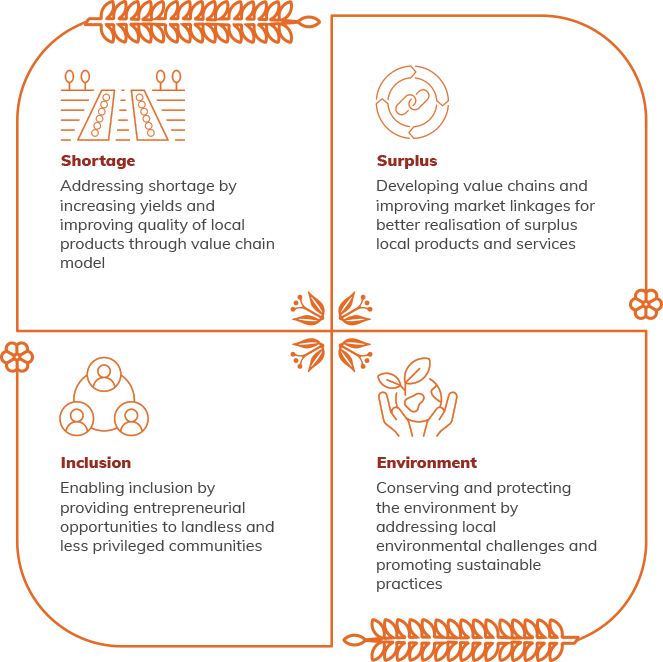
ICICI Foundation has been empowering rural communities of the country since 2017 through its Rural Livelihood Programme. Aimed at enhancing the livelihood of rural population, the programme is focused on invigorating the rural ecosystem to make it self-sustaining. It is structured to create and nurture the local value chains, and to facilitate the development of entrepreneurship.
261,984
Women beneficiaries since inception till March 31, 2022
74,885
Women beneficiaries in fiscal 2022
Key Intervention Areas of Value Chain
Animal Husbandry
Backyard Poultry
Beekeeping
Climate Smart Agriculture
Dairy Farming
Goat Rearing
Floriculture
Horticulture
Inland Fishery
Lac Cultivation
Minor Forest Products
Mushroom Farming
Natural Fibre
Pulses and Grains
Turmeric
Vegetable Cultivation
Driving Interventions across Value Chain
ICICI Foundation is running a host of projects and initiatives to positively impact the entire value chain in villages.
Value Chain Interventions
ICICI Foundation has been implementing various value chain-based projects with the objective of providing sustainable livelihood through locally relevant commodities. It is a comprehensive intervention with multiple activities, which aim at positively influencing the production of a commodity as well as its by-products. The intervention also offers market and credit linkages to the beneficiaries and involve the local authorities including Kisan Vikas Kendras and agriculture universities. This all-encompassing approach helps to improve the income of beneficiaries and transform the villages into self-sustaining ecosystems.
A value chain-based project adopts a bottom-up approach. It begins with understanding the macro and micro-environment at the identified cluster of villages through collaborations with community members and local government. Thereafter, it co-creates systemic solutions by designing programmes to nurture value chains for specific products and services. The programmes make optimal use of local resources including locally relevant trades and skills. This is made possible by providing pro bono skill development training in the relevant trades. Over the years, the interventions have introduced innovative agricultural practices, helped in recycling waste materials and even converted ecosystem threats into income-generating opportunities. Finally, the intervention facilitates market and credit linkages to the beneficiaries.
Pillars of Value Chain Interventions
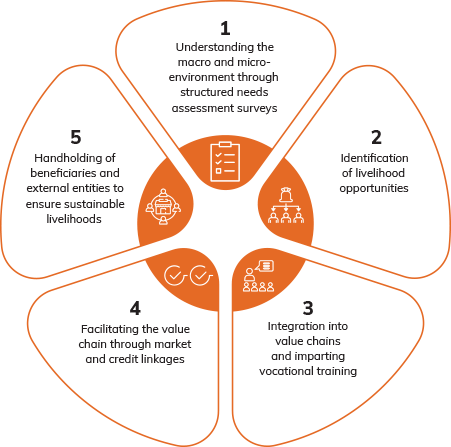
Providing Multiple Livelihoods with Moringa Plantation
A successful value chain intervention initiated during fiscal 2022 was in Moringa in Bihar’s water and food stressed Gaya and Jahanabad districts. ICICI Foundation Rural Livelihood Programme undertook the plantation of Moringa, a food packed with many micro and macronutrients, to provide sustainable livelihood to the local people.
Aim
The intervention is aimed at lifting farmers from poverty to middle-income. It also seeks to improve the nutrition and personal care of their families, regenerate land and restore the ecosystem, besides promoting entrepreneurship among rural youth, women and marginalised communities for enhancing their sources of livelihood.
Project
Train farmers in harvesting Moringa leaves and pods.
Connect farmers and producers with Eco Development Committees (EDCs) to procure seeds and seedlings. Also, provide them with market linkages.
Impact in fiscal 2022
Supported plantation of 100,000 Moringa trees covering 25 acres of forestland.
Set up two processing units.
Over 950 kg of Moringa powder supplied to 600 Aanganwadi centres.
Positively impacted 1,000 beneficiaries.
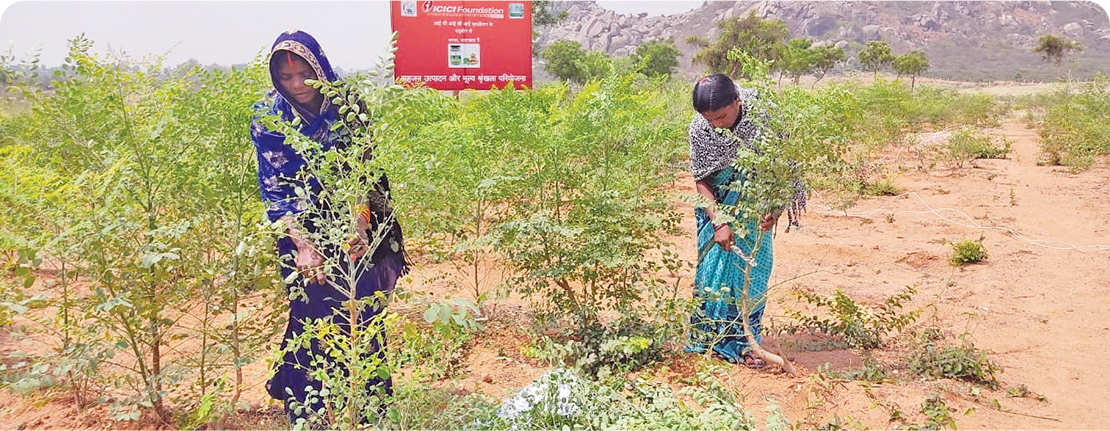

Various aspects of the Moringa value chain initiative in Gaya district, Bihar: Farmers plucking Moringa for processing (top), solar panel at the processing centre (bottom left), Moringa leaves being dried at the processing centre (bottom right)
Adding Value to Kerala's Jackfruit Business
Jackfruit, a vitamin and mineral powerhouse, is grown in abundance in Kerala. This results in business opportunities of fruit for processing and value addition.
ICICI Foundation identified a Self-Help Group (SHG) in Mala block of Thrissur district, Kerala to help them get better returns by making value-added products with jackfruits. Inspired by their improved earnings, the SHG members are scaling up their operations and more SHGs are coming forward too.
Growing popularity
Of ‘Niravu’ brand of jackfruit
chips and wafers
100
Farmers sell jackfruit every day to the SHG
150 kg
Processing capacity per day
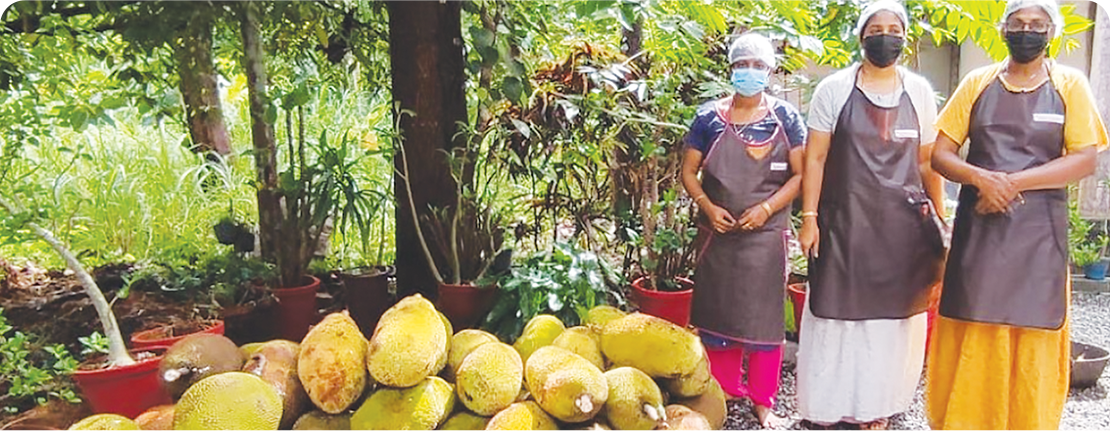

SHG members collecting jackfruit from farmers, processing it and making jackfruit chips in Thrissur, Kerala
Incentivising Growth in Dairy Farming Value Chain
As part of its dairy farming value chain interventions, ICICI Foundation Rural Livelihood Programme is underway in various states, including Andhra Pradesh, Karnataka, Madhya Pradesh, Maharashtra, Punjab, Rajasthan, Tamil Nadu, Telangana and Uttar Pradesh. A 15-day training course, coupled with information-sharing on best practices, helps enhance the income of the dairy farmers. The training involves live demonstrations and audio-visual capsules to teach cattle-rearing practices, feed management and calf management, health and hygiene besides making the farmers aware of high-yield fodder varieties and encouraging cultivation.
Farmers are also taught about the cultivation of Azolla – a protein-rich nutritive fern for supplementing the cow feed, thus enhancing the quantity and quality of the milk produced. They are further encouraged to create village milk co-operatives to enable them to supply milk to nearby areas and make by-products like cheese, paneer (cottage cheese), dahi (curd), khoya (dried evaporated milk solid). ICICI Foundation Rural Livelihood Programme also collaborates with the local animal husbandry department to set up vaccination camps and conduct regular health check-ups.
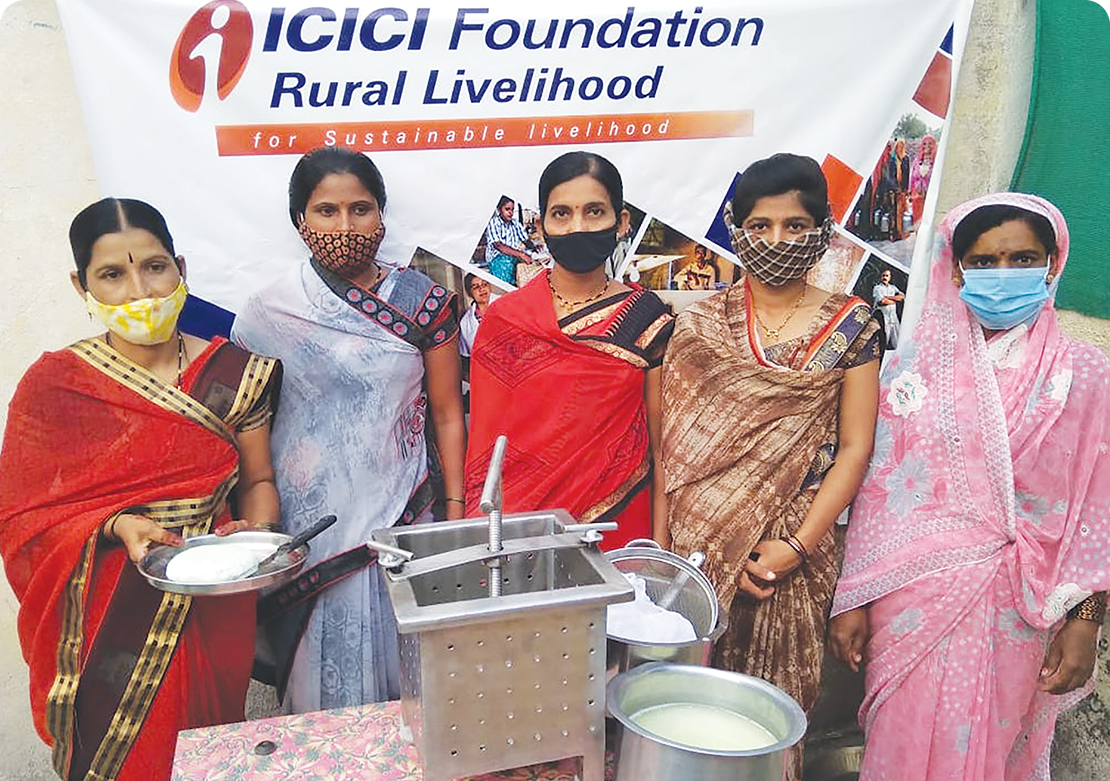
Beneficiaries of 'Dairy Farming' intervention making paneer (cottage cheese) at Sirsani village in Barwani district, Madhya Pradesh
Partnering Aspirational Districts to Catalyse Growth
The Government of India has identified 117 ‘aspirational districts’ to improve the socio-economic status of the citizens. ICICI Foundation has aligned itself to introduce various livelihood interventions in 36 of these aspirational districts. To implement its programmes in rural areas, ICICI Foundation works closely with local authorities. Till March 31, 2022, ICICI Foundation has trained nearly 31,000 beneficiaries from 31 of these ‘aspirational districts’ through various value chain interventions.
Driving Rural Transformation
The predominantly tribal Narmada district in Gujarat, an ‘aspirational district’, emerged as a new area of value chain intervention for ICICI Foundation Rural Livelihood Programme in fiscal 2022. Most of the villages in the district are situated in hilly and inland areas where goat rearing is the major source of livelihood. During the year, ICICI Foundation identified 15 villages in Garudeshwar and Dediyapada talukas of Narmada district to start Goat Value Chain project to benefit 5,000 tribals over a period of four years. An integrated approach has been adopted to maximise impact, encompassing training for best practices in goat rearing, development of watershed, organising animal health camps, setting up of community goat sheds and kitchen garden.
Impact created in fiscal 2022
- Positively impacted 945 women beneficiaries.
- Identified and trained 19 Pashu Sakhis 'Friends of Animals' who help villagers to upkeep health of livestock. Equipped with first aid kits from ICICI Foundation, each Pashu Sakhi supports health of goats across 40-50 households.
- Constructed five community goat sheds that cover 7-10 families each.
- Conducted over 1,200 animal health check-up camps.
- Provided two animal ambulances to cover the villages.

Various aspects of the integrated value chain initiative in Narmada district, Gujarat. Farmers being trained in backward kitchen garden at Panchla village (left) and an animal health checkup camp at Zarwani village (right)

Promoting Micro Entrepreneurship to Empower the Underprivileged
ICICI Foundation for Inclusive Growth also works to uplift the economic condition of the farmers by aiding and training them across the agricultural value chain. It supports them to set up micro processing units, which enhances the locally realisable value of commodities like pulses, fruits, vegetables, milk, spices, among others. In addition, ICICI Foundation provides services of an equipment bank, from where the farmers can borrow equipment for use. It facilitates the establishment of these micro processing units through Self-Help Groups (SHGs) and Farmer Producer Organisations (FPOs) across the country. In fiscal 2022, 200 micro processing units were set up with combined capacity of 3,800 tonnes a year, with the potential to double the income of the beneficiaries.
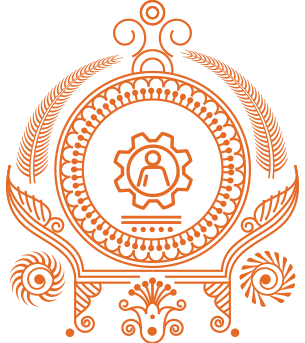
Ecology Management and Conservation Initiatives at Sariska Tiger Reserve
The Sariska Tiger Reserve, spread over 881 square km in Alwar district, Rajasthan, is home to more than 40 mammalian species, 345 birds and a variety of other species. ICICI Foundation has launched ‘Project Vanya Jeevan’ in collaboration with the Rajasthan Forest Department to work towards livelihood of the forest dwellers by reducing dependency on forest produce. Further, it aims at promoting environmental and conservation principles.
The project involves water management and grassland development at various locations. It aims at checking commercial exploitation of the forest and minimising the dependence of the villagers on it. It will also help ensure a better balance between conservation initiatives on one hand and the increasing cattle population, large road networks, on the other.

ICICI Foundation's initiatives at Sariska Tiger Reserve
Augmenting availability of water and grasslands
- Installed solar-powered pumps of up to 10 horse power at 10 locations to operate borewells.
- Created grasslands at three locations.
- Constructed 30 new water holes.
- Built earthen bunds in eight locations for rainwater harvesting.
Enhancing livelihood of forest dwellers
- Opened skilling centre for local youth.
- Courses on 'Electrical Home Appliances' and 'Two Wheeler Service Technician'.
- Imparted additional training on dairy farming and agriculture.
- Opened three milk collection centres.
- Renovated community halls for training and community meetings.
Strengthening monitoring and conservation of tigers
- Donated 23 motorcycles to collect data required for analysing the movement of tigers.
- Donated five SUVs with 4x4 wheel drive to travel on hilltops and local terrain.
- Constructed solar panels at the beat posts of forest rangers to provide electricity.
- Built new tracks inside reserve forests.
Earthen bunds are U-shaped structures that help in collecting rainwater and sometimes even floodwaters.

Trainees undergoing the 'Two-wheeler Service Technician' course at Sariska in Alwar district, Rajasthan

ICICI Foundation donated motorcycles to forest rangers
ICICI Academy for Skills (ICICI Academy) is engaged in addressing identified skill gaps since October 2013. It aims to provide sustainable employment opportunities to underprivileged youth through industry-relevant, job-oriented training. This unique livelihood and skilling initiative is also designed to provide skill training through modules on financial literacy. ICICI Academy also imparts soft skills and life skills to the youth.
ICICI Academy offers pro bono training in 11 technical and four non-technical skills, through its 28 centres across 21 states and union territories. With a comprehensive approach that provides employment support for all successful trainees, the centres are well equipped with state-of-the-art practical labs to support and enhance learning. ICICI Academy has collaborated with 14 Knowledge Partners to create the courses. It has 1,300 placement partners on board to provide job opportunities to the successful candidates. In fiscal 2022, ICICI Academy opened two new centres, one in Sariska in Rajasthan and the other in Pangadi, Maharashtra. The new centres mark ICICI Academy’s new strategy of setting up operations in rural and tribal areas.
25,893
Underprivileged youth trained in fiscal 2022
185,543
Underprivileged youth skilled since inception till March 31, 2022
42%
Women among individuals skilled since inception till March 31, 2022
Innovating to Ensure Continuity amid Pandemic
To ensure continuity of its skill development programme during the pandemic, ICICI Academy innovated a phygital (combination of digital and hands-on) learning methodology, as a new model of skilling. It digitised nine technical and two non-technical courses, accredited by National Skill Development Corporation. Further, it conducted online sessions, provided practical training near the participants’ homes with the help of knowledge partners, and held online job fairs for successful trainees. It also offered placement assistance to alumni who had lost jobs during the pandemic.
Key Outcomes
Digital enrolment of
100%
Trainees
Digital content development
700
Training videos
1,000
Hours of content
Digital certificates
Provided after completion of training
Digital meets
With recruiters
Digital management
Of trainees

Trainees attending a session of 'Electrical and Home Appliance Repair' in Mohali, Punjab

Trainees of ‘Home Health Aide’ course attending a practical session in Mumbai, Maharashtra

Trainees attending a session on ‘Selling Skills’ at ICICI Academy for Skills in Guwahati, Assam
Technical Courses
Assistant Beauty Therapist
Central Air Conditioning
Electrical & Home Appliance Repair
Home Health Aide
Multi Skilled Technician
Paint Application Techniques
Power Application Engine Preventive Maintenance
Pumps & Motor Repair
Refrigeration & AC Repair
Tractor Mechanic
Two & Three Wheeler Service Technician
Non-Technical Courses
Financial Services Associate Course
Office Administration
Retail Sales
Selling Skills
Knowledge Partners Who Helped ICICI Academy Create Course Content


Since 2011, ICICI Foundation has been managing activities of two Rural Self Employment Training Institutes (RSETIs) in Udaipur and Jodhpur. The Bank’s focus is on strengthening these institutes by upgrading their infrastructure and spreading awareness about the training courses available for rural unemployed youth. It is also supporting them through introduction of new training courses.
ICICI RSETIs create sustainable livelihood opportunities for unemployed rural youth, hailing from the adjoining areas, by imparting vocational training programmes. They also help the youth to become entrepreneurs by facilitating credit and market linkages. During the last decade, the RSETIs have evolved as a hub for providing sustainable livelihood in the region. To expand their outreach, satellite centres have been established in adjoining rural areas. These RSETIs have gained recognition and appreciation by the Ministry of Rural Development for their quality training, standardisation and for transforming the livelihood ecosystem in the hinterland.
Impact
132,004
Candidates trained since inception till March 31, 2022
59%
Women benefited till March 31, 2022
20
Satellite centres
17,571
Candidates trained in fiscal 2022
Creating Sustainable Livelihood Opportunities
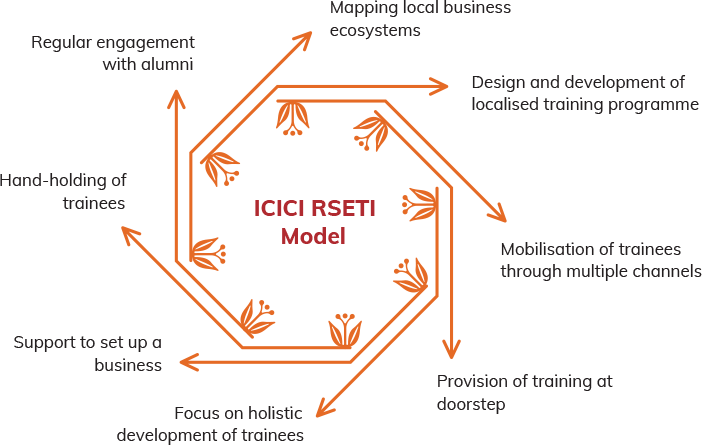
Courses
Beauty Parlour Management
Cellphone Repairs & Service
Dairy Farming & Vermicomposting
Electric Appliances Repair
Electric Motor Rewinding & Pump Set Maintenance
Goat Rearing
Masonry & Concrete Works
Office Administration
Refrigeration & AC Repair
Sand Stone Cutting & Finishing
Two-Wheeler Mechanic
Women’s Tailor

Beneficiaries of 'Dairy Farming' course at a milk collection centre in Jodhpur, Rajasthan
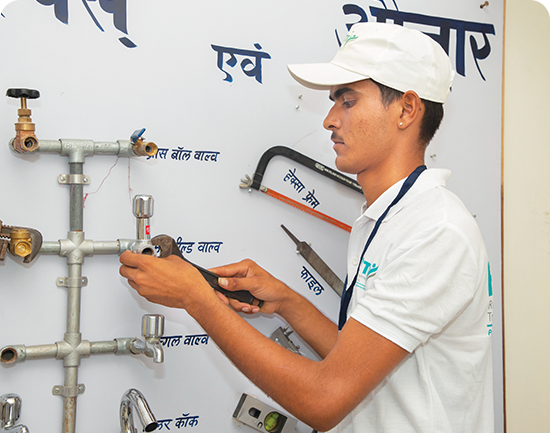
A trainee attending a session on 'Sanitary Plumbing' in Udaipur, Rajasthan
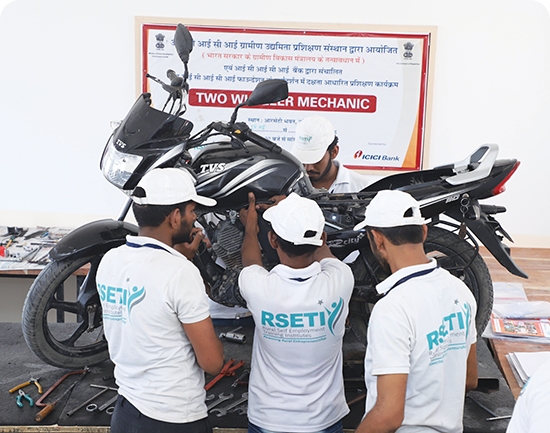
Trainees attending a session on ‘Two-Wheeler Mechanic’ course in Jodhpur, Rajasthan
